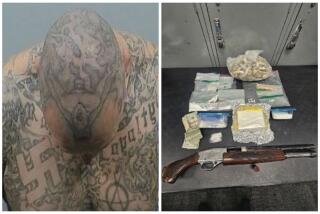U.S. issues indictments in alleged Mexican Mafia, drug cartel scheme
A notorious prison gang and a Mexican drug cartel were on the brink of forging a powerful alliance as part of an effort to muscle into the Southern California methamphetamine business with an army of street dealers, federal and local authorities confirmed Tuesday.
In announcing a pair of indictments, authorities said they were able to disrupt the planned merger between the Michoacan drug cartel and leaders in California’s Mexican Mafia prison gang.
“This would have opened a superhighway for drugs and guns and given this cartel an exclusive franchise,” U.S. Atty. Andre Birotte Jr. said.
During the operation, agents and law enforcement officials said they seized $19 million worth of methamphetamine.
The alleged alliance between the cartel and the prison gang was revealed in a pair of indictments that named more than 40 members of a powerful Los Angeles street gang. The investigations involved the federal Bureau of Alcohol, Tobacco, Firearms and Explosives; the Drug Enforcement Administration; and L.A. County law enforcement agencies.
One of the indictments, which details the alleged business deal between the prison gang and the La Familia Michoacana cartel, named six members and three associates of the prison gang and four people linked to the cartel and its successor, Los Caballeros Templarios.
The indictment outlines a venture called the “Project” in which cartel members would be given “free rein” to sell methamphetamine in Southern California and provides protection for incarcerated cartel members in exchange for money and methamphetamine going to Mexican Mafia members, according to the indictment.
“Today’s salvo against the Mexican Mafia is part of a 20-year fight to curb the influence of the prison gang both inside prison walls and on the streets of Southern California,” Birotte said.
The second indictment charged nearly three dozen members of the Florencia 13 gang with racketeering, drug and weapons counts. Some are also allegedly members of the Mexican Mafia.
Some ranking members of Florencia 13 are already being held at the maximum-security prison in Pelican Bay but continue to operate the gang through smuggled instructions, working hand-in-hand with the Mexican Mafia prison gang, according to the indictment.
The gang controls swaths of Los Angeles County and in each territory sets up outposts to deal drugs and operate illegal gambling, prosecutors allege.
Federal officials equated the alliance to a major manufacturer looking for wholesalers, distributors and bill collectors. “This is the first time the street gangs and cartels have come together on this scale,” Birotte said.
Had the partnership not been disrupted, Birotte said, it would have “opened the floodgates” to hundreds of pounds of meth moving onto the streets of L.A. each month.
Birotte said the cartel “had made some down payments to start the project.” In one instance, he said, it paid $150,000 to key members of the Mexican Mafia.
One of the indictments reveals that it was the cartel’s leaders who initially approached gang leaders about a “union” and that Mexican Mafia representatives had traveled to Mexico to meet with the cartel leadership.
By eavesdropping and using informants, authorities said they were able to decipher the conversations between the two sides, even though they spoke in coded language.
According to one conversation, Mexican Mafia leaders considered La Familia to be a bigger player in drug trafficking than Chapo Guzman, the reputed drug lord who heads the Sinaloa cartel.
“We believe that we have initiated a crippling effect to those members who are still loyal to the Mexican Mafia crime organization,” L.A. County Sheriff Lee Baca said.
Federal and local officials acknowledged Tuesday that much of the Mexican Mafia’s business is overseen by leaders who are behind bars at state prisons such as Pelican Bay who continue to pass messages to make deals and run various street gangs.
Birotte said the federal indictment would see those leaders, if convicted, transferred to prisons across the U.S. in an effort to disrupt their ability to communicate.
Federal investigators say that although they have sought to bring charges against other members of the Mexican Mafia leadership before, Tuesday’s charges are the most far-reaching effort.
More to Read
Sign up for Essential California
The most important California stories and recommendations in your inbox every morning.
You may occasionally receive promotional content from the Los Angeles Times.











